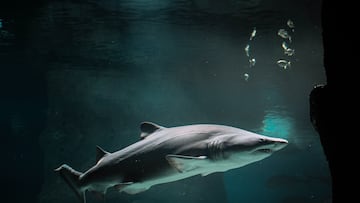NATURE
Found: oldest shark on Earth, but how old is it really?
A group of scientists appear to have found the oldest shark in the world, and it was not what they were expecting to find.

Sometimes discoveries in nature come out of nowhere, far, far away from where it could have been expected. And that is exactly what happened recently as a group of scientists came across the world’s oldest animal, one used to much colder waters, off the coast of Belize, in the Caribbean.
“Prehistoric” Greenland sharks
Published in the scientific journal ‘Marine Biology,’ and initially thought to be a sixgill shark, a deep-sea predator, it turned out to be “most likely” a Greenland shark (Somniosus microcephalus), the oldest living creature on Earth.
“We suddenly saw a very slow moving, sluggish creature under the surface of the water,” explained Devanshi Kasana, a biologist from the Conservation and Predator Ecology Laboratory at the International University of Florida, to Mashable. “It looked like something that would exist in prehistoric times.”
The great question remains as to whether this particular Greenland shark migrated to the Caribbean from Arctic waters or if it spent most of its life in the depths of the tropical waters in the region. This question remains unanswered, but there is a high likelihood that more of these enigmatic creatures roam the dark depths of the Caribbean, hidden from our sight.
Sharks, the longest-lived vertebrates on Earth
“I doubt it’s the only one,” explained Demian Chapman, Director of Shark and Ray Conservation Research at the Mote Marine Laboratory and Aquarium. According to the National Ocean Service, this species has a lifespan of between 250 and 500 years and can reach lengths of five to six meters, making it one of the largest in the world.
Their growth is slow and gradual (about one centimeter per year), and females reach sexual maturity after more than 100 years. Their slow growth reflects their leisurely metabolism and also their long lifespan: they are the longest-lived vertebrates on Earth.
The importance of moving slowly is evident in sharks. They spend a significant part of their lives in darkness, thousands of feet below the water’s surface, where they grow slowly, move slowly, and age slowly. In the deep sea, where nutrients are scarce, moving slowly to conserve energy is a crucial adaptation.
Furthermore, they are nearly completely blind and navigate using the Earth’s magnetic field. Specifically, Greenland sharks are well adapted to these depths, living for over two and a half centuries, and possibly much longer.






